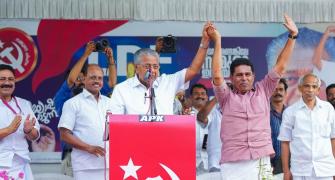Of the four key pillars that hold up the land Bill edifice, namely, compensation, resettlement and rehabilitation, social impact assessment and consent, it is the last one where all the controversy is focused.

Nobody trusts anybody where forcible land acquisition is concerned ostensibly under “public purpose”, “eminent domain” or “greater common good”.
This is at the heart of all the angst and clamour against the amendments in the land Bill.
Of the four key pillars that hold up the land Bill edifice, namely, compensation, resettlement and rehabilitation, social impact assessment and consent, it is the last one where all the controversy is focused.
Civil society, particularly, does not trust the state. It has reason not to.
The notorious colonial eraLand Acquisition Act of 1894 had been thoroughly misused.Under its catch-all “public purpose” window, the state was the biggest culprit. Jairam Ramesh, the principal architect of the Land Acquisition Act, is on record saying:
“Across India, land has been acquired by government and it remains unutilised even after 30-40 years of acquisition. The government itself was the biggest squatter”.
“PSUs have been the worst defaulters in terms of their poor record of resettlement and rehabilitation.”
“Over the decades, over 4 crore (40 million) tribals had been displaced without rehabilitation and compensation, and could possibly be a prime cause for left-wing extremism in affected parts of the country.”
It led to forcible, heartless acquisition programmes as well as “lazy acquisitions” where acquired land was hugely in excess of needs or just left unutilised.
More dangerously, the licence to define anything as ‘public purpose’ resulted in crony-capitalism in land deals.
It is reported to have peaked at the height of the SEZ (special economic zone) fever resulting, as we all know, in a spate of protests.
The other route cleverly followed was for private sector to sign JVs with statal entities, giving the state a minority stake in a project and then getting the state to forcibly acquire land at notified low prices.
But the state does indeed have a role to play in a democracy in making up its mind on behalf of the people it represents as to when “public purpose” kicks in.
In an article in the Hindustan Times on August 15, 2009, noted economist (and one-time chief economic advisor to the government), Kaushik Basu wrote: “Modern economic theory sheds light on this; and, somewhat unexpectedly, comes out on the side of government intervention.
As a consequence, even some of the most aggressively market-oriented nations in the world, such as the US, have provisions that allow the state to intervene and acquire land for large-scale industrial or commercial use.
The economic argument shows that, left entirely to voluntary transactions, many socially desirable industrialisation projects would never get implemented.
This so-called ‘hold-up problem’ was briefly touched upon by Amartya Sen in this Penguin Lecture on ‘Justice and India,’ in Kolkata on August 5, though he did not elaborate on it.”
Among the three classical factors of production — government plays a pivotal role in developing and regulating capital and labour markets.
It cannot excuse itself from the land market.
The recent amendments to the land Act, as promulgated in the ordinance, seek to broaden the ambit of “public purpose” vis-à-vis the United Progressive Alliance (UPA)’s Act — where public purpose was more tightly defined. A tighter definition, resulted inevitability in having to seek “consent” for projects of national importance.
This is what the current government believes goes against its agenda of speedy economic development and job creation.
So, we have a classic dilemma — that a society is being asked to put its finger, through democratic processes, on a shade of grey between the black and white of “individual rights” and “greater common good.”
The problem gets compounded by the fact that nobody quite knows who in the sarkari system actually defines “public purpose.”
Is it the prime minister, the chief minister or the district magistrate ? And how is such a weighty and complex decision taken, which results in forcible acquisitions and displacement of a settled way of life?
So the “trust deficit” has two clear components. One, historically not trusting the state in defining “public purpose”; and two, the lack of clarity on the processes by which such a decision is sought to be arrived at in the present.
The UPA government tried to bridge this chasm by putting most acquisitions under the “consent” clause.
The current government argues that it severely hurts speedy economic development.
Is there a solution?
Here is a suggestion. It would be worthwhile considering setting up an independent and credible “public purpose validation commission” at the central and state levels as an acceptable via media between the contentious extremes of “80 per cent consent” and “forcible acquisition.”
Such a commission could well be structured with eminent citizens across different walks of life who can be trusted by the public at large to validate or not validate the government’s claim for forcible acquisition for public good.
This could well forge an agreement between warring political parties as well as provide reassurance to the people of India at large.
It would certainly be more impactful and relevant than the proposed quasi-judicial authority — the Land Acquisition Rehabilitation and Resettlement Authority, which is supposed to hold hearings in places where acquisition is taking place.
The nation wants an ex-ante body for endorsing “public purpose.” Not an ex-post body for cleaning up the mess.
Vinayak Chatterjee is Chairman of Feedback Infra vinayak.chatterjee@feedbackinfra.com










